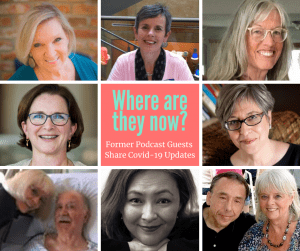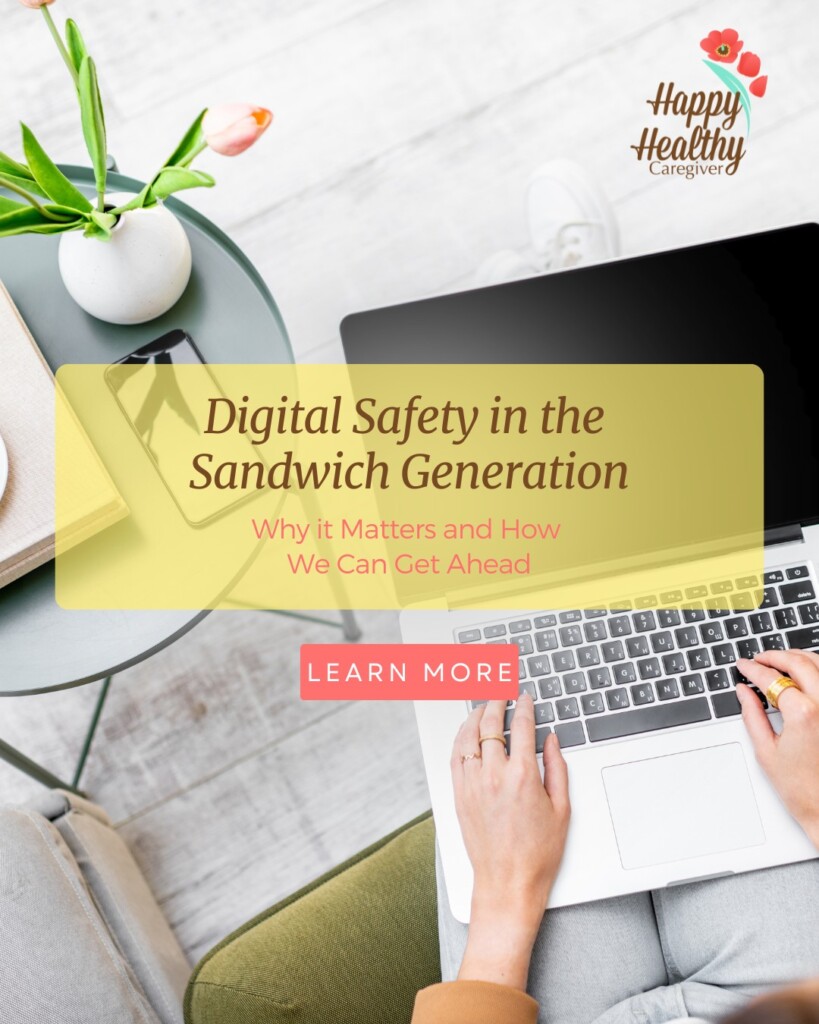The Happy Healthy Caregiver podcast has featured 45 caregiver spotlight episodes! More than ever, during this coronavirus pandemic, I have been wondering how these former and active family caregivers are coping with the change and additional responsibilities.
The best way to find was to reach out and ask!
I asked them a few different questions and have summarized their responses into two posts. This is the first of two articles which focuses primarily on the question:
“How has your family been impacted by the COVID-19 pandemic?”
Here is a summary of what they shared:

Yogi Caregiver, Gael Alba (episode # 82) started isolating earlier than most since she lives near one of the first diagnosed cases in Pennsylvania. Since Valentine’s Day, her husband has been sheltering in place in an RV near his work commitment in South Carolina. Gael’s mother-in-law is 95 and lives in Georgia and all their planned visits ‘are kaput’. Gael is also pivoting her entrepreneurial business. With her hands-on Yoga Therapy, public book readings and self-care retreats being postponed or canceled, she has started creating her online teaching initiative “A Year on the Pilgrims Path”.
Gael’s advice for family caregivers:
“In changing times, each of us can know what is best to do next when we center ourselves in silence and listen. Really, really listen. Once peace occurs within the stillness, you’ve found yourself a reliable guide. Go there.”
Remember Sherilyn Lee (episode # 66) the writer and roller derby referee turned caregiver after Burning Man? She says while many have had to adjust to sheltering in place, her family has already been doing it for years. Her parents only leave home for medical appointments. Handwashing, cleaning, and disinfecting have always been part of their caregiving practice. “In the last few years,” Sherilyn says, “we have had a lot of practice in being under stressful situations and keeping caregiving supplies well stocked.”
Sherilyn continues to travel to her parent’s home every 10 days or so. In California, caregivers are considered essential workers. Now with Covid-19, when coming from the airport or an errand, Sherilyn not only washes her hands thoroughly but also changes her clothes.
Weeks ago, Christina Britton Conroy (episode #39) believes she had the Covid-19 virus. While she never had a fever or trouble breathing, she had all the other symptoms and felt terrible. Her symptoms occurred before testing was readily available.
About a year and a half ago, Christina’s husband died from Parkinson’s/dementia. For his last 10 months he lived in a nursing home. She is grateful he died before Covid-19 so that she was able to be by his side at the end of his life.
Christina’s passions are performing and listening to live entertainment. “The first week of social distancing with no outside diversions was awful,” Christine shared. “I was unhappy to be living alone with no one to hug, until some radio program talked about being stuck in close quarters with people you don’t like. Since then, I’m grateful for my solitude.” Christine regularly connects with US and international friends using FaceTime, Zoom, or WhatsApp.
Jean Lee (episode #87) of AlzAuthors says her 92-year-old mother in law is in a nursing home and they have not seen her in over a month. “Very disheartening for all of us, especially her, as she is so confused at this point in her life,” Jean says. The family communicates by the occasional phone call when the staff can work it in. This is tough since her mother in law is also deaf in one ear. Jean’s mother-in-law was already admitted to the hospital once and was in isolation for suspected Covid-19. Jean says, “she has to be terrorized to see everyone coming at her with masks. It is a terrible time to be elderly and infirm.”
Jean’s advice for family caregivers:
“Caregivers, please realize although you are distanced, you are not alone. Reach out on social media to remain connected.”
Beth Suereth’s (episode #77) husband has been furloughed from his job (i.e. not working, no income). She is grateful that they are paying full health insurance for their family. She and her son are working out the logistics to be able to get his personal belongings from college. Beth no longer helps play taxi for her 13-year-old granddaughter. Instead, they have a weekly social distancing lunch together – talking through a screen. Beth sips on warm soup while bundled up in the yard ten feet outside of her granddaughter’s window on the first floor. Beth is also sharing her end of life planning guide with the caregiving community and anyone it can help.
Donna O’Donnell Figurski (episode #62) and her husband David, who had a traumatic brain injury in 2005, have been sheltering in place since the middle of March. “Because David’s health is compromised”, Donna says, “we aren’t taking any chances with this deadly virus.” Since his activities have been limited due to his disabilities, David’s life has not drastically changed. Donna, on the other hand, has been doing her in-person writing groups through Zoom and her theater production has been canceled. “This complete loss of freedom is strange to me,” Donna shares, “but I am focusing on my writing, finishing the audio recordings for my published book and making revisions on the manuscript for my new book.”
Donna’s advice for family caregivers:
“Please take your lead from your medical personnel and the scientists. They have spent many years dedicating their lives and becoming proficient at their craft. Trust them! But, use your own common sense too. Be grateful for each day you have. And, though you may not love the idea of being a prisoner without bars in your own home, it beats the alternative.”
Be on the lookout for Part 2 next week where we highlight all the good news that has happened for our podcast guests since they were on the show.




